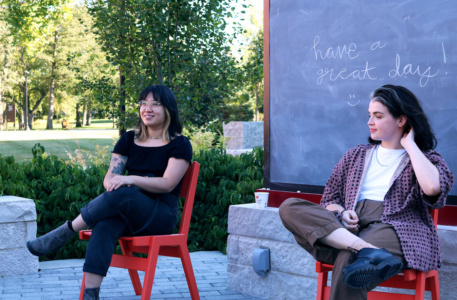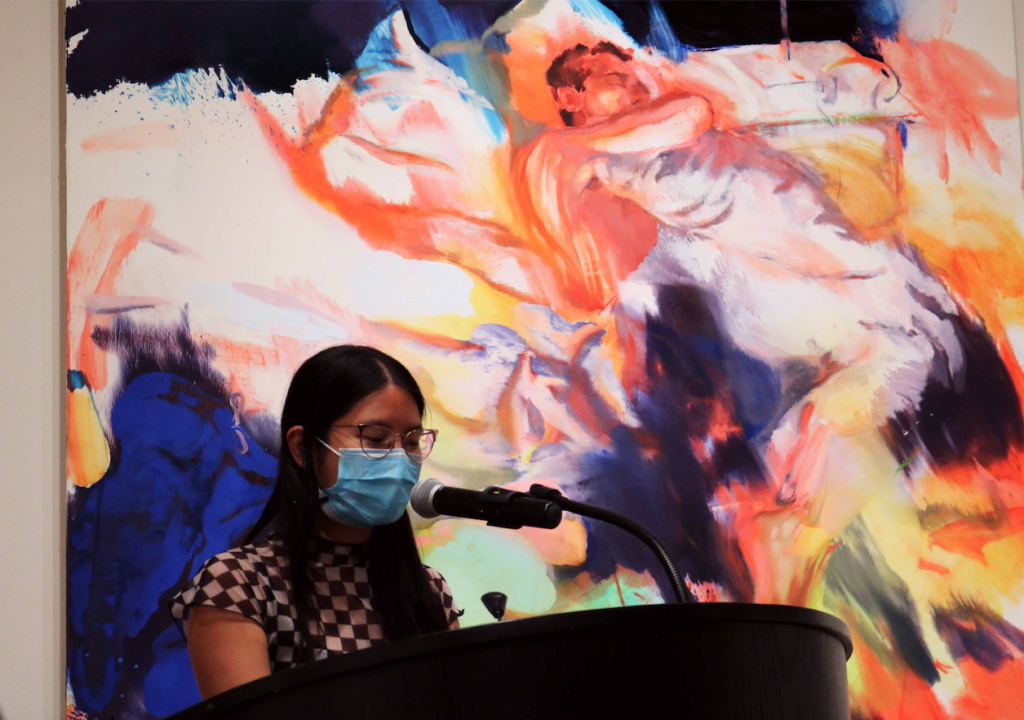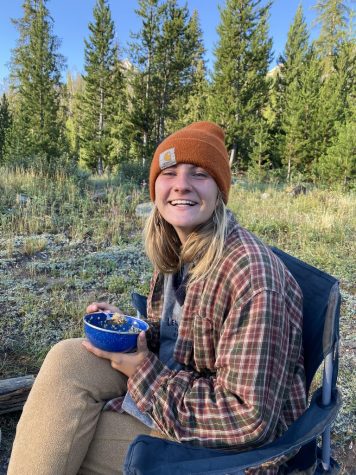Emily Mester `14 used to attend Writers@Grinnell events as a mandatory part of her Craft of Creative Nonfiction class with Professor Ralph Savarese, English. On Thursday, Sept. 23, Mester returned to Writers@Grinnell, this time as a writer, as it hosted the first in-person round table and reading since the spring of 2020.
In past Writers@Grinnell events, the roundtable served as a semi-formal way for students to get to know the authors chosen for that week’s reading. This year, Director of Writers@Grinnell, Professor Dean Bakopoulos, English, hosted a roundtable with Mester and her literary agent, Clare Mao `14.
The roundtable was followed by an evening reading by writers Larissa Pham and Santiago Sanchez, Grinnell College Mellon fellow in fiction, at the Grinnell College Museum of Art.
Five students attended that afternoon’s roundtable in Kington Plaza, where Mao and Mester shared their experience and advice about working in the literary industry.
The pair were roommates on the first floor of Cleve Hall during their second year and remained close friends throughout their time at Grinnell. Now, Mao is Mester’s literary agent, and they just sold her first book, “American Bulk,” which will be released in the fall of 2023.
Initially, the two parted ways after graduation. Mao took an internship with Sterling Lord Literistic, a literary agency started by Grinnell Alum Sterling Lord `42. Meanwhile, Mester lived with her parents for a year while she worked to save up money and apply to MFA programs. She then attended the Iowa Writers’ Workshop where she completed her MFA in creative non-fiction.
Mao now works as a literary agent for Europa Content, the New York City-based literary agency. Mao and Mester reconnected and worked together to turn a series of essays Mester wrote during her time at the Writers’ Workshop into her first book.

Mester and Mao both feel that Grinnell fosters a special community for writing. Both recalled attending numerous Writers@Grinnell events during their time on campus, and say the Mentored Advanced Projects (MAPs) they completed while enrolled provided a strong foundation for their future careers.
Mao noted that Grinnell has a “crazy track record” of MFA placement and students going on to do amazing things with their writing. Both Mao and Mester encouraged the students present at the round table to follow their passions and pursue a career in writing.
“What I’ve learned is that it’s not as improbable as I used to think it was to work in the writing world. It’s not like playing in the NBA which I used to sort of see it as. Clare became my agent, and we just sold my book to Norton,” explained Mester.
Bakopoulos agreed with Mester’s sentiment adding, “What Grinnell is really good about, and a lot of professors and a lot of fields are good at, is [going] for what you want to do, what you are excited and passionate about, not what you think is safe. And there’s not a lot of places that will coach you for four years on going after things that are interesting to you.”
Their connections in the writing community go beyond just Grinnellians; Mao and Mester are also good friends with Sanchez and Pham. Like Mao and Mester, Sanchez and Pham are friends from college. They met in the back of a chemistry lecture at Yale and after deciding that science wasn’t for them, forged their path in the literary world.
Sanchez and Pham are now both accomplished writers. Sanchez is Grinnell’s current Mellon fellow in fiction. They received their MFA from the Iowa Writers’ Workshop and their work has been published in “McSweeney’s,” “ZYZZYVA,” “Subtropics,” and “Joyland.” It was also included in “Best American Short Stories 2020”. Pham’s work has appeared in “The Paris Review Daily,” “Bookforum,” “Guernica,” “The Nation,” and elsewhere.
Sanchez kicked off the event with a flash fiction piece titled “In the waiting room.” When they finished reading, they exhaled deeply.
“Oof, that’s intense,” they said. “Thank you so much for listening to my horny 12-year-old fiction.”
When they finished reading their next piece, “You Will Not Cry,” the room filled with applause, and they swiftly invited Pham to join them at the podium. She seemed timid and hesitant to take over the mic, stating that Santiago was a “tough act to follow.” Santiago reassured her, giving her a hug and a kiss on the cheek, their adoration for each other apparent.
Pham read an essay from her first full-length book “Pop Song,” which was published in May 2021. She read excerpts from the essay “Camera Roll (Notes on Longing),” and when she finished, many in the room had tears in their eyes. Her writing captured the feeling of desire so common to the human experience.
After the reading, the event shifted to a Q&A in which Sanchez spoke more about desire, a common theme in their work. “Desire is mysterious and, in the moment, in my experience of it, there is this thrill of seeing what will happen and what can happen,” they said. “In writing about it, I get to face those questions and actually look at them more closely. But looking at it can also be painful. You can discover things about real desire that hurt.”
The reading was additionally engaging because the queer authors were able to read their work among the Museum’s current exhibit “Queer/Dialogue,” a space that invited discussion about many of the topics covered in their work.
“To hear stories of desire and images trying to capture a moment and a feeling in this space is magical,” said Bakopoulos. “It felt almost like you were meant to read in this space.”
In addition to discussing their thoughts on desire, Sanchez and Pham were asked to speak about their friendship. They took turns gushing about the other one, both emphasizing how much the other’s support means to them.
“She just inspires me to write, to take my work seriously, to take a chance on myself and my writing which is something that is really hard to do. To pursue art in a world that tells you not to do art,” said Santiago.
As the event dwindled to a close, Bakopoulos reminded everyone in the room of the importance of friendship within the writing community.
“We have Emily and Clare here. We have Santiago and Larissa. The literary world and the artistic world thrive on friendships, and you never know at the age that many of you are which friendships will become incredibly important to you. If you see a stranger [at Writers@Grinnell], introduce yourselves because we’ll probably start to see each other a lot more over the next couple years and we have real evidence that these friendships in classes and spaces like this have become life-changing.”

























































